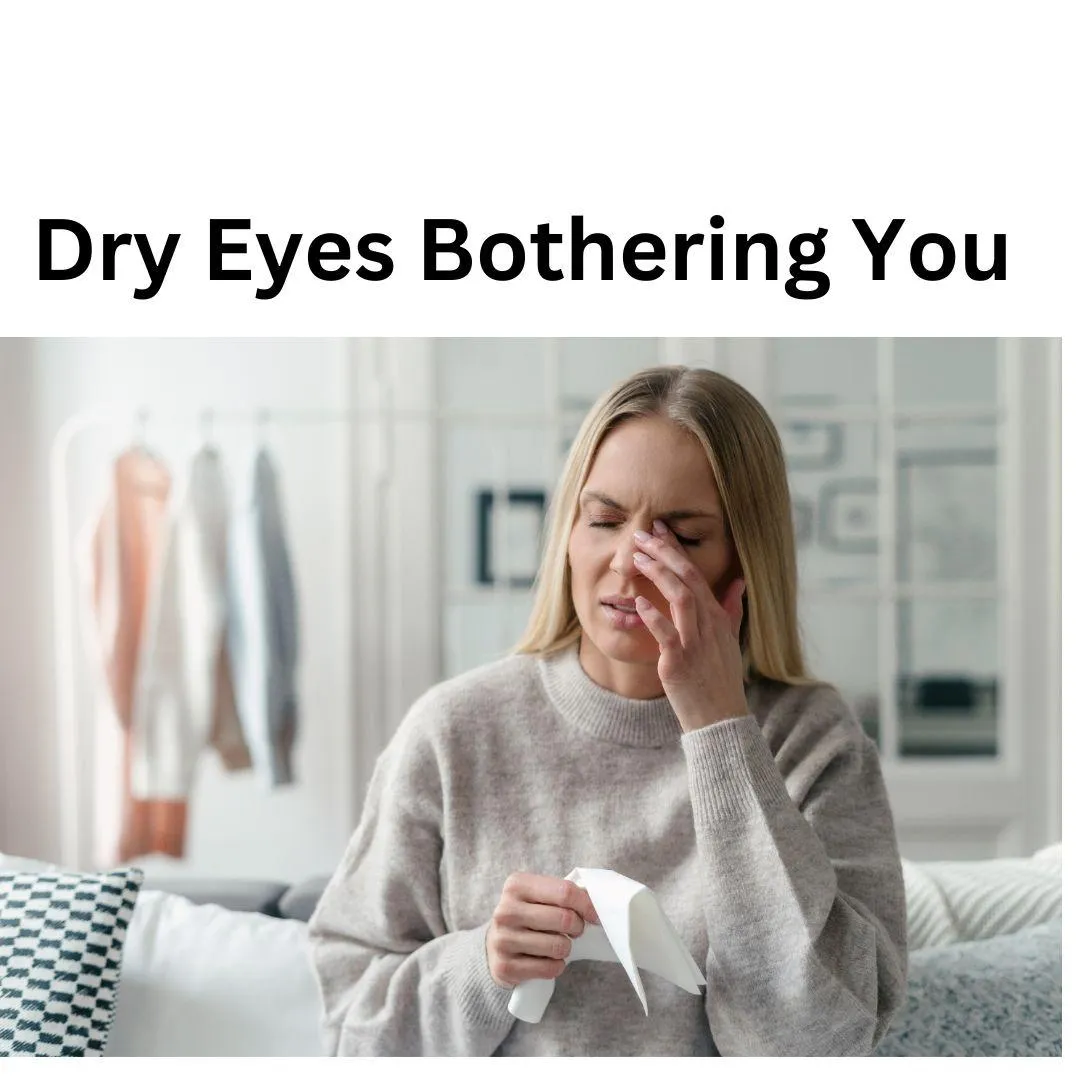*Open to Florida Residents
Blog
Blog

How Hormonal Imbalances Affect Your Eyes
Dry eyes can be significantly affected by hormonal imbalances, particularly changes in estrogen levels. Hormones play a vital role in maintaining the health of the ocular surface and tear production. In this blog we will bring to light the relationship between hormonal imbalances and dry eyes, as well as strategies to alleviate symptoms.
Hormones That Can Affect Dry Eyes
Estrogen and Tear Production
Estrogen fluctuations can affect the quality and quantity of tears. While estrogen has a protective role in many body systems, an imbalance (either too high or too low) may disrupt the delicate balance of tear film production.
Estrogen dominance or a drop in estrogen levels such as during menopause, pregnancy, or postpartum periods, can reduce oil production from the meibomian glands, leading to increased tear evaporation and dry eyes.
Androgens and Dry Eye
Androgens are critical for the proper functioning of the meibomian glands, which produce the lipid (oil)layer of the tear film. This lipid layer prevents tears from evaporating too quickly.
Androgens help regulate the production of proteins, lipids, and other molecules essential for a stable tear film.
A lack of androgens, common in women during menopause, aging, or in certain medical conditions such as polycystic ovary syndrome or PCOS, can reduce meibomian gland activity.
Androgen deficiency leads to a thinner or disrupted lipid layer, causing increased tear evaporation and dry eyes.
Androgens have anti-inflammatory properties. A deficiency may increase inflammation in the ocular surface and exacerbate autoimmune conditions, such as Sjogren’s syndrome, which is closely associated with severe dry eye disease.
Women are more susceptible to androgen-related dry eye issues than men, particularly after menopause.
Progesterone's Role in Dry Eyes
Progesterone influences the structural integrity and function of the lacrimal and meibomian glands.
It also interacts with estrogen to regulate the overall environment of the ocular surface.
High progesterone levels, such as during pregnancy, can alter tear film composition and lead to symptoms of dryness or irritation.
Progesterone imbalances may also indirectly affect tear production by interacting with other hormones, such as estrogen and androgens.
Thyroid Disorders and Tear Production
Thyroid Eye Disease: Often associated with Graves’ disease (a form of hyperthyroidism), Thyroid Eye Disease (TED), causes inflammation and damage to the tissues around the eyes, including the tear glands. This results in decreased tear production and unstable tear film.
Hashimoto’s Thyroiditis: This autoimmune form of hypothyroidism can also contribute systemic inflammation, affecting the ocular surface and tear production.
Thyroid disorders can disrupt the function of the lacrimal and meibomian glands, leading to decreased production of aqueous (water) and lipid (oil) components of tears.
Systemic inflammation caused by thyroid disorders can affect the ocular surface, increasing the risk of dry eye disease. Chronic inflammation can damage the delicate tissues responsible for tear secretion.
In hyperthyroidism or Graves’ disease, changes in the position of the eyeball (proptosis) can expose more of the eye’s surface, leading to increased evaporation of tears.
How to Relieve Dry Eyes Caused by Hormonal Imbalances
Lubricating Eye Drops: Use preservative free artificial tears to keep the eyes moist and comfortable. For more severe cases, consider lipid-based eye drops to address meibomian gland dysfunction.
Nutritional Support: Omega-3 Fatty Acids: Incorporate omega-3s from fish oil, flaxseeds or supplements to support tear production and reduce inflammation. Drink plenty of water to maintain overall hydration. .
Lifestyle Adjustments: Reduce screen time or take frequent breaks to minimize eye strain and blinking issues. Use a humidifier to maintain moisture in the air, especially during winter with the heaters in running.
Warm Compresses: Apply warm compresses to the eyes to unclog the meibomian glands and improve oil secretion.
Medical Intervention: Consider prescription eye drops, such as Restasis, or Xiidra, for chronic cases.
Hormonal Therapy: Consult a healthcare provider about hormonal treatments, such as HRT. Treat underlying hormonal conditions such as thyroid disease, to improve overall eye health.
Regular Eye Exams: Visit an eye care professional regularly for evaluations and personalized treatment options.
By addressing hormonal imbalances and adopting a holistic approach to eye care, you can significantly alleviate dry eye symptoms and improve overall comfort. If symptoms persist or worsen, consulting with an ophthalmologist is essential.

How Hormonal Imbalances Affect Your Eyes
Dry eyes can be significantly affected by hormonal imbalances, particularly changes in estrogen levels. Hormones play a vital role in maintaining the health of the ocular surface and tear production. In this blog we will bring to light the relationship between hormonal imbalances and dry eyes, as well as strategies to alleviate symptoms.
Hormones That Can Affect Dry Eyes
Estrogen and Tear Production
Estrogen fluctuations can affect the quality and quantity of tears. While estrogen has a protective role in many body systems, an imbalance (either too high or too low) may disrupt the delicate balance of tear film production.
Estrogen dominance or a drop in estrogen levels such as during menopause, pregnancy, or postpartum periods, can reduce oil production from the meibomian glands, leading to increased tear evaporation and dry eyes.
Androgens and Dry Eye
Androgens are critical for the proper functioning of the meibomian glands, which produce the lipid (oil)layer of the tear film. This lipid layer prevents tears from evaporating too quickly.
Androgens help regulate the production of proteins, lipids, and other molecules essential for a stable tear film.
A lack of androgens, common in women during menopause, aging, or in certain medical conditions such as polycystic ovary syndrome or PCOS, can reduce meibomian gland activity.
Androgen deficiency leads to a thinner or disrupted lipid layer, causing increased tear evaporation and dry eyes.
Androgens have anti-inflammatory properties. A deficiency may increase inflammation in the ocular surface and exacerbate autoimmune conditions, such as Sjogren’s syndrome, which is closely associated with severe dry eye disease.
Women are more susceptible to androgen-related dry eye issues than men, particularly after menopause.
Progesterone's Role in Dry Eyes
Progesterone influences the structural integrity and function of the lacrimal and meibomian glands.
It also interacts with estrogen to regulate the overall environment of the ocular surface.
High progesterone levels, such as during pregnancy, can alter tear film composition and lead to symptoms of dryness or irritation.
Progesterone imbalances may also indirectly affect tear production by interacting with other hormones, such as estrogen and androgens.
Thyroid Disorders and Tear Production
Thyroid Eye Disease: Often associated with Graves’ disease (a form of hyperthyroidism), Thyroid Eye Disease (TED), causes inflammation and damage to the tissues around the eyes, including the tear glands. This results in decreased tear production and unstable tear film.
Hashimoto’s Thyroiditis: This autoimmune form of hypothyroidism can also contribute systemic inflammation, affecting the ocular surface and tear production.
Thyroid disorders can disrupt the function of the lacrimal and meibomian glands, leading to decreased production of aqueous (water) and lipid (oil) components of tears.
Systemic inflammation caused by thyroid disorders can affect the ocular surface, increasing the risk of dry eye disease. Chronic inflammation can damage the delicate tissues responsible for tear secretion.
In hyperthyroidism or Graves’ disease, changes in the position of the eyeball (proptosis) can expose more of the eye’s surface, leading to increased evaporation of tears.
How to Relieve Dry Eyes Caused by Hormonal Imbalances
Lubricating Eye Drops: Use preservative free artificial tears to keep the eyes moist and comfortable. For more severe cases, consider lipid-based eye drops to address meibomian gland dysfunction.
Nutritional Support: Omega-3 Fatty Acids: Incorporate omega-3s from fish oil, flaxseeds or supplements to support tear production and reduce inflammation. Drink plenty of water to maintain overall hydration. .
Lifestyle Adjustments: Reduce screen time or take frequent breaks to minimize eye strain and blinking issues. Use a humidifier to maintain moisture in the air, especially during winter with the heaters in running.
Warm Compresses: Apply warm compresses to the eyes to unclog the meibomian glands and improve oil secretion.
Medical Intervention: Consider prescription eye drops, such as Restasis, or Xiidra, for chronic cases.
Hormonal Therapy: Consult a healthcare provider about hormonal treatments, such as HRT. Treat underlying hormonal conditions such as thyroid disease, to improve overall eye health.
Regular Eye Exams: Visit an eye care professional regularly for evaluations and personalized treatment options.
By addressing hormonal imbalances and adopting a holistic approach to eye care, you can significantly alleviate dry eye symptoms and improve overall comfort. If symptoms persist or worsen, consulting with an ophthalmologist is essential.
Let me help you achieve your goals.
Disclaimer: We understand that every individual's experience is unique and results may vary depending on various factors, such as attitude, adaptability, personal history, and overall health. For your safety and well-being, we highly recommend consulting your physician before beginning any program. At Elite Sexual Hormone Health, we do not diagnose, treat, or prescribe any medical or psychological disorders. We urge you to seek the care of a qualified physician or psychotherapist if you suffer from any psychological or medical disorder. Thank you for choosing Elite Sexual Hormone Health as your partner in your journey towards wellness.
© 2026, Elite Sexual Hormone Health. All rights reserved.
Privacy Policy | Terms of Service | Disclaimer | Accessibility
© 2026, Elite Sexual Hormone Health. All rights reserved.
Website by Hypnotherapy Accelerator





